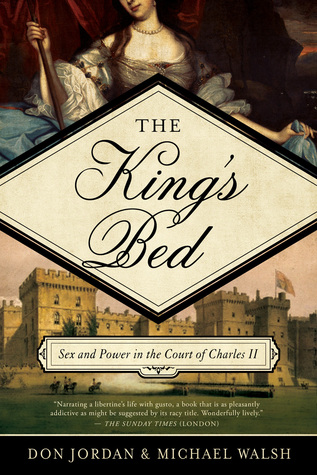Today I'm looking at a biography of Charles II of Britain, who did quite a lot to earn the sobriquet of The Merry Monarch. I mean, this man was an absolute party animal to the point Horrible Histories did a rap song about how much he partied. Oh, and while I'm at it, this is also the monarch who rewarded the man who attempted to steal the crown jewels. Yes. Seriously. This was a person who was monarch of Britain. For twenty-five years. So there's a certain morbid fascination with Charles II's reign and the sheer excesses he indulged in and, as Jordan and Walsh illustrate, Charles II became little more than a puppet of Louis XIV of France towards the end of his reign, his lavish lifestyle propped up by extensive subsidies from the French treasury. Interestingly enough, Charles II's most lasting legacy is the numerous bastard children he sired on his many, many mistresses, a significant number of whom he lavished titles and estates. As a result a significant number of the upper crust in Britain today can trace their ancestry back to him.
This book's focus is mostly on the numerous affairs and libertine lifestyle of Charles II and his relationship with his numerous mistresses throughout his life, although it covers his life from beginning to end, with some slight context before and afterwards. Charles grew up into the events of the English Civil War and was forced as he entered adolescence to flee to France with his mother, while his father was executed by Oliver Cromwell and other Roundheads. For years Charles lived in exile, dependent on the charity of the French court and other nobles for his support and, rather than studying statecraft or other subjects, Charles threw himself into hedonistic excess. The result, when Cromwell finally died and Charles was restored to the throne as Charles II, was that he was largely uninterested in the actual management of the kingdom so long as his lavish lifestyle could be supported.
If there are any great achievements of Charles II's reign, I honestly can't say I know what they are. Jordan and Walsh briefly mention the establishment of the Royal Society and the Greenwich Observatory under Charles's reign, but in their text they choose to focus on his sex life and spendthrift habits, as well as somewhat disastrous foreign policy. Perhaps there were some things of positive significance which Charles managed to accomplish while he was king, but the book makes only passing mention to them. The result is a very long and somewhat repetitive story of Charles falling in love with various mistresses, the bestowing of extraordinary gifts unto his paramours which cuts deeply into his cash reserves, and then the public outcry at the behavior which had left the crown destitute. Honestly I got the impression that for the entire time he was king, Charles never really stopped being the feckless playboy, at least as Jordan and Walsh depict it.
In many ways, the disastrous foreign policy during the reign of Charles II was a result of his extravagant lifestyle. In addition to bestowing expensive gifts outright, Charles also often picked up the gambling debts of his favorite mistresses and would bestow upon favorites incomes from certain taxes. Thus revenue that should have been going to the Exchequer were being given directly to countless courtiers and mistresses, further decreasing the king's income. Not to mention that in one example Jordan and Walsh provide, when Parliament demanded to know what had happened to some five million pounds they had granted the king, only half of that sum could be accounted for. Because of these spendthrift habits, Charles decided to mothball some of the strongest and most expensive ships in the Royal Navy, which certainly contributed to the disaster of the Second Anglo-Dutch War and the burning or capture of many of those mothballed ships in harbor by a Dutch raiding force.
Ultimately Charles's need for more money would push him closer and closer to Louis XIV and into the arms of Louise Renee de Panancoet de Kerouaille, a woman sent to England expressly to lure Charles to her bed. Through extensive financial support and control of Charles II, France was able to assure British neutrality as they extended their influence into regions such as Alsace and Flanders, much to the frustration of the more anti-French factions in British politics at the time. As Jordan and Walsh conclude Charles II ended up as little more than a figurehead while Louis XIV decided what British policy truly would be.
Overall this book is interesting, if it gets somewhat repetitive. Charles doesn't seem to change terribly much as a person through his reign as king, and even from his life before his accession to the throne. Depending on your views of sexual morality and financial responsibility Charles can seem a lovable scoundrel or an embarrassment to the monarchy and best forgotten. I'm left with the impression that Charles's reign was filled with flash and glamor, but utterly lacking in substance.
- Kalpar


No comments:
Post a Comment